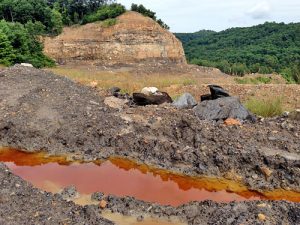
Acid mine drainage collects at the KD #2 mine site shortly after the state halted work at the mine. Photo courtesy the Kanawha Forest Coalition
The West Virginia Department of Environmental Protection has brought a lawsuit against Florida-based Keystone Industries over a series of Clean Water Act violations at the controversial KD #2 surface mine.
The 413-acre mountaintop removal mine in southern Kanawha County, W.Va., has been met with much opposition by local residents and others concerned about the mine’s impacts on nearby communities and on Kanawha State Forest, which borders the mine.
The suit, filed on March 9 in the Kanawha County Circuit Court, alleges that runoff from the KD #2 mine contains measurements of aluminum, iron, manganese, selenium, total suspended solids and pH that are in violation of the National Pollution Discharge Elimination System permit granted to Keystone Industries under the Clean Water Act. The primary evidence supporting this claim is the company’s own quarterly discharge monitoring reports submitted to the DEP.
The Kanawha Forest Coalition, a grassroots environmental watchdog group comprised of local community members, has conducted water monitoring at the site since shortly after the mine began operating in 2014. Through these efforts, the coalition has identified numerous and persistent regulatory violations, prompting the DEP to issue 40 enforcement actions against the KD #2 mine to date.
“It was shocking to realize that it was through citizen complaints, and not DEP monitoring, that our land was being protected,” said Becky Park, a Kanawha Forest Coalition member from Charleston. “What it boils down to is we are the government. We can’t assume that DEP employees are monitoring permitted mining operations. We have to read the permits, understand the agreements made with mining companies, be willing to use the systems in place to submit complaints, and go to court when the systems fail to stop violators.”
Daile Boulis, who lives in the community of Loudendale immediately adjacent to the KD #2 mine feels similarly.
“From what I understand, this is one of best written permits in the state, and still, there are forty violations in two years? Imagine what the company would be getting away with, without the citizen enforcement and public media exposure? The same thing goes for the DEP,” said Boulis. “The only reason 75-80% of the violations have been enforced and fined is due to pressure from the Kanawha Forest Coalition. When you consider all of the other mines in West Virginia that don’t have a group like Kanawha Forest Coalition working on behalf of the impacted citizens, that’s terrifying! Our lives should not be the cost of doing business in West Virginia.”
By initiating its own suit against Keystone Industries, the DEP has prevented the Kanawha Forest Coalition or other grassroots organizations from filing suit on similar grounds. However, the organization may choose to file as an intervenor in the case, a move that would earn them a seat at the table — but not veto power — in potential future settlement negotiations with Keystone.
Doug Wood, a retired DEP official with 33 years of experience in water resources, is skeptical of his former agency’s motives in bringing this case against Keystone.
“This lawsuit seems to be an attempt to stop advocates from filing their own suits, and an attempt to get a little money to start water pollution treatment when Keystone says, ‘keep the bond, we’re outta here,’” said Wood. “… The DEP seems to be most interested in getting a court settlement so they can say, ‘we solved that problem’ even though the systemic problems that led to this disaster remain unsolved.”
The DEP’s suit against Keystone is expected to go to trial in spring 2017. Meanwhile, the Kanawha Forest Coalition continues to monitor conditions at the mine, regularly testing impacted streams and alerting the DEP of persistent problems.


